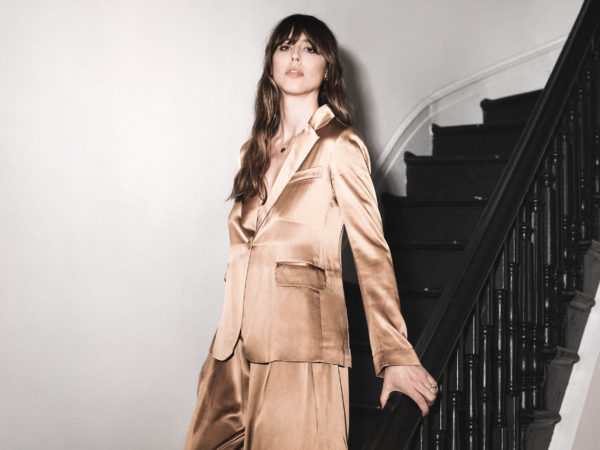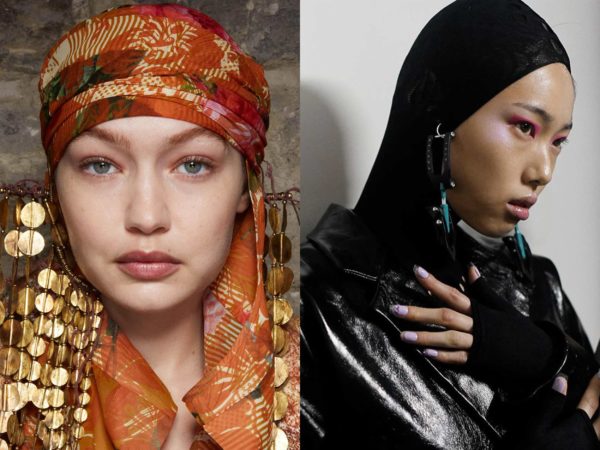The US only bans 11 potentially harmful ingredients from beauty products, while the EU bans 1,328. The Hollywood icon and Henry Rose founder joins Document to discuss the dangers of an unregulated industry and her emotional relationship with fragrance
I lay in my bed curled up in a ball for days. The pain was crippling. After several doctors’ visits, the mystery cramps from which I suffered turned out to be due to fibroids and polyps—common ailments that anywhere from 20 to 70 percent of females will experience in their lifetime. The treatment options were daunting—I could have my uterus removed, but that would render me infertile. I could have the non-cancerous growths removed surgically from my uterus, but that could also cause me to be unable to have children. I could also opt to treat them naturally. I immediately ordered a book called Healing Fibroids: A Doctor’s Guide to a Natural Cure, and discovered that the noncancerous growths that had developed inside of me could have been aggravated by a number of ingredients known as endocrine disruptors that are commonly used in everyday products that mimic hormones. “Any disruption in the hormonal system, no matter how subtle, can lead to a myriad of gynecological complaints, from PMS to endometriosis to the development of fibroid tumors, read the book,” wrote the Dr. Allan Warshowsky, who wrote the book with Elena Oumano. One is Triclosan—which is used in many antibacterial products; another is Phthalates—which is used to make plastic more flexible; and Bisphenol A (BPA)—which is used to create polycarbonate plastics.
Michelle Pfeiffer is very aware of the dangers of certain ingredients that are commonly used in fragrances. That’s why she stopped wearing scents nearly three decades ago in order to safeguard herself and her young children from potential health issues. The actress—who has starred in films like Dangerous Minds, White Oleander, Avengers: Endgame, Maleficent: Mistress of Evil, and the upcoming French Exit—took matters into her own hands to develop the perfect kind of beauty line with “100% ingredient transparency.” Henry Rose, which launched in 2019 after years of research, is cruelty free, hypoallergenic, and contains no parabens, phthalates, formaldehyde, known or suspected carcinogens, and no known or suspected endocrine disruptors. It’s also EWG Verified™. Henry Rose is a beauty line that I can use with confidence because I know that it doesn’t contain ingredients that could harm my health.
The United States cares so little about what we expose our bodies to that it only bans 11 ingredients that could endanger our health. By contrast, the European Union bans approximately 1,328 chemicals from cosmetics that are known or suspected to cause cancer, genetic mutation, reproductive harm, or birth defects. I spoke to Michelle about why she stopped wearing fragrance, and why the brand expanded into hand sanitizers, luxurious candles, and silky smooth body creams.
Ann Binlot: It’s so lovely to meet you. You weren’t wearing any fragrance before you developed Henry Rose. Why?
Michelle Pfeiffer: Right after my kids were born around 27 years ago, I started paying more attention to what was in the products that I was exposing my kids and myself to and, at that time, there just wasn’t a lot of information to be found. And one day, after years of stressing about that I stumbled upon the Environmental Working Group’s Skin Deep database, and that’s where they rate personal care products by hazard level. One of the things that kept coming up with a really high hazard level was fragrance. I took that to mean, well, a fragrance must be really toxic. But what I didn’t understand, and that I learned later, is that if anything has a smell, it can be categorized as fragrance. Ingredients can consist of hundreds of ingredients that are pulled from, you know, thousands of hazardous ingredients. So, I tried every non-toxic, natural fragrance that I could find. I love fragrance. I have a very emotional relationship with fragrance. I couldn’t really find anything that smelled like I wanted it to smell, and that I knew to be safe. If you don’t know what’s in something, you can’t really be assured of its safety.
“So much of what we love about fragrance that it’s emotional and it’s personal, right? We never really stop to think about it.”
Ann: It’s so interesting how certain scents stay with you for so long.
Michelle: What I discovered, which I didn’t know going into this, is so much of what we love about fragrance that it’s emotional and it’s personal, right? We never really stop to think about it. We just like what we like but it’s because so much of it is tied in with memory and what that scent means to us.
Ann: Why did you decide to venture outside of fine fragrances and, you know, do hand sanitizer, diffuser oils, and body creams? Why was it the right time now?
Michelle: One of the many things that I learned about fragrance is that everything and everyone is impacted by fragrance, and fragrance in so many things that you don’t even think about. I started this brand because I, as a consumer, got very worn out and stressed about trying to find products that actually performed, and that were actually as safe as they claimed to be—and constantly being fooled by clever wording on packaging. What does ‘clean’ mean? What does ‘natural’ mean?
I learned that a lot of people are so intolerant of fragrance. And not, you know, necessarily sending them to the hospital, but I think it’s something like 30 percent of people have really bad sensitivities to fragrance, and they have allergic reactions, and it gives them anywhere from a migraine that is debilitating and can kind of down for the day. I have really, really dry skin, I have really, really sensitive skin, and I can use this product, and it performs, and I know that it’s safe. There are people who can’t walk into a room if there’s a candle burning without it sending them into some kind of a migraine. The little hand sanitizer, I didn’t anticipate doing that. But then COVID hit and there are a lot of hand sanitizers out there that are not safe, that have some chemicals in them. Not all of them, but some of them, and so I thought [to make one] and also why not make it smell a little bit better than your average hand sanitizer?
“I assumed, like so many people assume, If it’s on the store shelves, if I can purchase it, my government has deemed it to be safe. And they haven’t. And they don’t even have the authority to do that.”
Ann: It’s crazy how the ingredients and beauty products in the United States are not as regulated as they are in places like Europe, where they are a lot stricter about what ingredients you can and cannot use depending on whether they’re safe for humans or not. What are some ways that conventional perfume and beauty products can harm your body?
Michelle: Well, you know, there’s been a history of some ingredients like formaldehyde and mercury. Formaldehyde is a known carcinogen. Phthalates and parabens are known to be hormone disruptors. And [some ingredients] are linked to cancer. These are all ingredients, like you said, that are on the ‘no’ list in Europe and in other parts of the world. So we’re very behind in that. And, as you know, the Personal Care Products Safety Act hasn’t been renewed since 1938. In the EU there are something like 1,300 banned ingredients that are not banned here. We have only banned 11.
Ann: Shit—
Michelle: I know, shit! We have only really banned 11. It’s crazy, you know? When I started this, it was like one day I was fed up and I said, ‘You know, a person shouldn’t have to choose between quality and safety when they’re choosing what they’re putting on their body. I assumed, like so many people assume, If it’s on the store shelves, if I can purchase it, my government has deemed it to be safe. And they haven’t. And they don’t even have the authority to do that.
Ann: I’m actually going through my own health issues right now. I’ve been doing a lot of reading. Apparently there are chemicals that mimic estrogen—
Michelle: That would be the hormone disruptors.
Ann: Yeah. Which could have probably added to my ailment and I’m just like, wow, like, I’ve been using all this stuff for all these years, and it could have affected my health and there’s no way to know.
Michelle: Your hormones affect everything in your body. It’s not only reproductive issues, though it does affect that as well, it affects everything and and it’s true that most people are not aware of that. It’s not until you get an illness and you start to question, and you sort of hinted at it, where medicine—you start looking at preventive work, you start questioning, Well, okay, what is causing this? And then you start looking a little bit deeper.
Ann: Yeah, it’s really disturbing. You were in Hollywood for so long, and now you’re in beauty, How are the industries different? Which do you like better?
Michelle: There are things I love about both of them. There are things I don’t love about both of them. I love to create, I’m a creative person. What I love the most about [beauty] is the creative part of it. I love coming up with new products, and I love package design. Being an actor—first of all, you have to start out resilient, because there’s a lot of rejection. You’ve got to pick yourself up, and you have to learn to separate the disappointment and the rejection from who you are. And this process certainly has been no different. It’s been 10 years of rejection, up until about three years ago. People looked at me like I was sort of crazy. I think I initially thought I would do some sort of a licensing deal with a cosmetic company, but [the industry] just wasn’t ready at that time. Ken Cook from EWG [suggested] going directly to the perfume houses because the climate has really changed. To my surprise, I had three different perfume houses interested in doing this with me.
Ann: What’s next for you and Henry Rose?
Michelle: We’re super excited about our candles. We’re really excited about our body creams since we’re in those winter months when you want to scratch your skin off. It’s been a busy time.
Ann: Thank you so much for this. I’m very happy you developed a beauty line that I know won’t harm my body.
Michelle: Thank you.



















